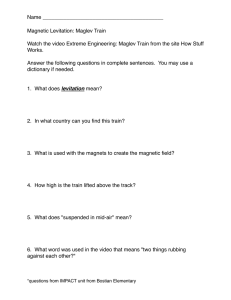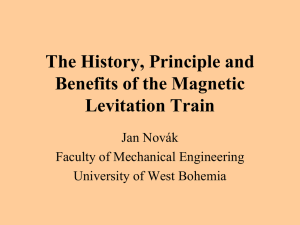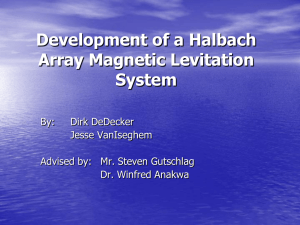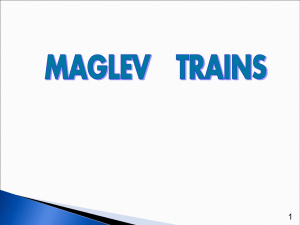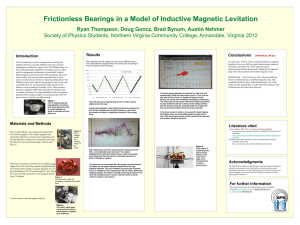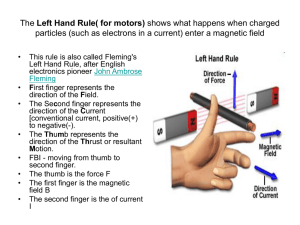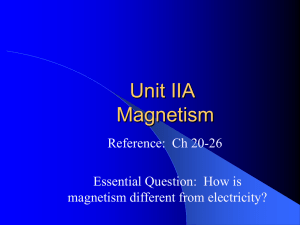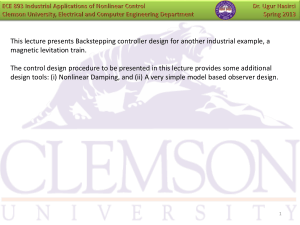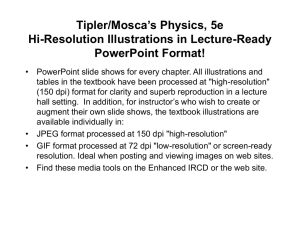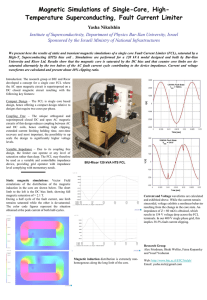Maglev Competition
advertisement
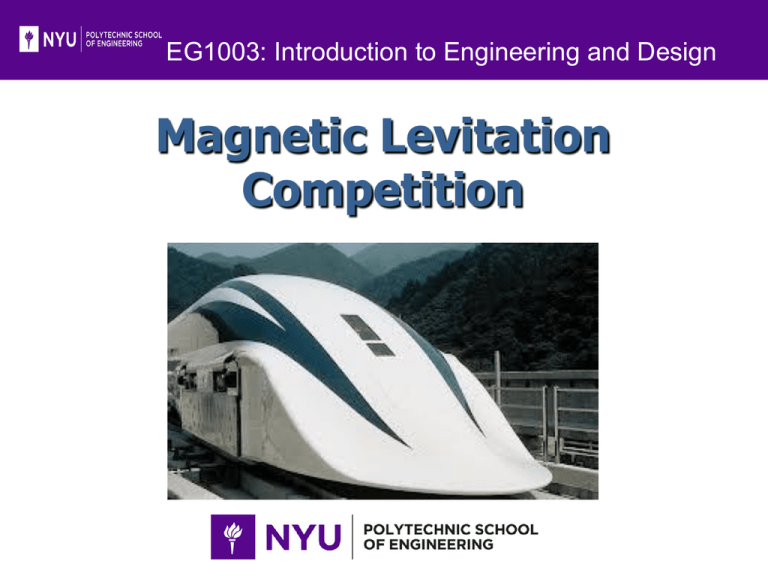
EG1003: Introduction to Engineering and Design Magnetic Levitation Competition Overview Objective Background Information Rules of the Competition Materials Procedure Report / Presentation Closing Objectives Assemble a cart suspended by magnetic levitation while keeping in mind the aspects of minimal design Reach Checkpoint A (LED 20) of the track Reach Checkpoint B (LED 40) of the track Magnetic Levitation Magnetic levitation is a type of levitation that depends on the magnetic fields generated from electromagnets Types of Magnetic Levitation: Electromagnetic Suspension (EMS) Electrodynamic Suspension (EDS) Electromagnetic Suspension (EMS) EMS: technique inducing a current through the electromagnets using large power source Magnetized electromagnets used to create propulsion in the Magnetic Levitation vehicles Electrodynamic Suspension (EDS) EDS: technique of exposing superconductors to magnetic fields that vary with time Time-varying magnetic fields operate the magnetic levitation vehicles more efficiently Earnshaw’s Theorem Earnshaw’s Theorem states levitation in a constant magnetic field is not possible Magnetic field requires additional guidance on the sides of the track for stability (so it doesn’t derail from the track) Magnetic Levitation Trains Three main components: Guidance, Propulsion, Levitation Propulsion and levitation are caused by electromagnets Guidance keeps the Magnetic Levitation trains on the track Magnetic Levitation Track Magnetic Levitation track LEDs and Photo resistors block using provided flag Power Supply Electromagnets Magnetic Levitation Cart Prototype of a Magnetic Levitation Cart Flag Outer Magnets Robot Arms (Custom) Central Magnet Type 2 Competition Rules The TA must approve your design before you are allowed to add your magnetic components All the materials you use in your design must be purchased, and are non-refundable The maglev cart must fit into the maglev track and must include the flag piece included in the maglev Lego kit You may conduct up to three trials and the best ratio of the three trials will be taken A TA must be present to oversee your trial or the results of that trial will become invalid Competition Rules All Magnetic components must be returned at the end of the experiment or your grade for this lab may be jeopardized. Your 3 trials will be scored using this equation: Material Price List Center Magnet Type 1:.………………………$1.00 (max one) Center Magnet Type 2:.………………………$1.50 (max one) Outer Magnets (Custom):..…………………………$0.75/each Long Magnets (3/4” x 3/8” x 1/16’’ thick):…………$0.50/each Square Magnets (3/8’’ x 3/8’’ x 1/8’’ thick):.………$0.25/each Bearings: …………………………………………….$0.25/each Maglev Lego Kit:.…………………………....……...$0.00 Procedure Brainstorm possible designs Sketch design on paper Obtain a Maglev Lego Kit after your design is approved by a TA Assemble your design using the Maglev Lego Kit Procedure Obtain the magnetic parts from a TA Create price list detailing your design Conduct practice runs to optimize your design Conduct your three trials to obtain your minimal design ratio Procedure Disassemble your cart and return all the parts to the Maglev Lego Kit Magnetic components must be returned before leaving the room Assignment: Report Individual Lab Reports Title page Discussion topics in the manual Include original data with instructor’s initials Scan in lab notes (ask TA for assistance) TA must initial that table and graph were completed Include table, graph, and photo of container Assignment: Presentation Team presentation State rules of competition Describe your design and its concepts Include table of class results and photo of cart How could your current design be improved? Refer to “Creating PowerPoint Presentations” found on EG website Closing Have all original data signed by TA Submit all work electronically Clean up workstations Return all unused materials to TA
